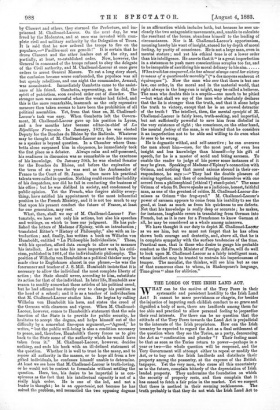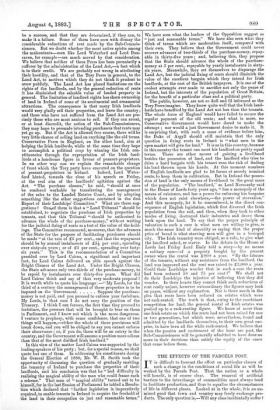THE LORDS ON THE IRISH LAND ACT.
WHAT can be the motive of the Tory Peers in their systematic and persistent hostility to the Irish Land Act ? It cannot be mere peevishness or chagrin, for besides the injustice of imputing such childish conduct to so grave and dignified a body of men, there are landlords among them far too able and practical to allow personal feeling to jeopardise their real interests. For there can be no question that the attitude of the Tory Peers towards the Land Act is prejudicial to the interests of the Irish proprietors. How can the Irish tenantry be expected to regard the Act as a final settlement of the question when they see the Tories, as a party, denouncing the Act as " confiscation and plunder " ? Their feeling must be that as soon as the Tories return to power—perhaps in a year or two—the whole question will be reopened, and the Tory Government will attempt either to repeal or modify the Act, or to buy ont the Irish landlords and distribute their property among the peasantry, at the expense of the British taxpayer. Yet the very men, who cause all this uncertainty as to the future, complain bitterly of the depreciation of Irish landed property. They undermine the foundation on which the security of property rests, and then complain that it has ceased to fetch a fair price in the market. Yet we suspect that there is method in their seeming recklessness. The truth probably is that they do not wish the Irish Land Act to be a success, and that they are determined, if they can, to make it a failure. Some of them have seen with dismay the considerable reductions of rent made by the Sub-Commis- sioners. But we doubt whether the most active spirits among the malcontents—men like Lord Waterford and Lord Dun- raven, for example—are much moved by that consideration. We believe that neither of these Peers has been pecuniarily a sufferer by the administration of the Land Act,—a fact which is to their credit. We are probably not wrong in attributing their hostility, and that of the Tory Peers in general, to the Land Act, to motives which they do not think it prudent to avow publicly. The Land Act has placed limitations on the rights of the landlords, and by the general reduction of rents it has diminished the saleable value of landed property in general. The limitation of landlord rights has shorn ownership of land in Ireland of some of its sentimental and ornamental attractions. The consequence is that many Irish landlords would very gladly sell their properties, and leave the country ; and those who have not suffered from the Land Act are pre- cisely those who are most anxious to sell. If they can arrest, or at least discredit, the action of the Sub-Commissioners, they may hope to persuade intending purchasers that rents may yet go up. But if the Act is allowed free course, there will be very little chance of selling land on anything like the old terms. Conservative Peers in England, on the other hand, aim at helping the Irish landlords, while at the same time they hope to accomplish a political coup by winning the Irish con- stituencies through the expropriation of the Irish land- lords at a handsome figure in favour of peasant-proprietors. In no other way can we explain the remarkable change of front which the Tory party have executed on the question of peasant-proprietors in Ireland. Indeed, Lord Water- ford hinted, towards the close of his speech on Friday, at the real aim of the landlords' agitation against the Act. " The purchase clauses," he said, " should at once be rendered workable by transferring the management of the sales to the Landed Estates Court, and by adopting something like the other suggestions contained in the first Report of their Lordships' Committee." What are those sug- gestions? Orissa them is that a "Land Tribunal" should be established, to negotiate the purchase of Trish properties by tenants, and that this Tribunal " should be authorised to advance the whole of the purchase-money," without waiting for the judicial fixing of rents as a test of the value of the hold- ings. The Committee recommend, moreover, that the advances of the State for the purpose of facilitating purchases should be made "at the rate of £3 per cent., and that the repayment should be by annual instalments of £3i. per cent., spreading over sixty-six years ; or of £4 per cent., spreading over forty- six years." This is the recommendation of a Committee presided over by Lord Cairns, a significant and important fact, for Lord Cairns delivered an able speech against the Bright Clauses of the Land Act. Under the Bright Clauses, the State advances only two-thirds of the purchase-money, to be repaid by instalments over thirty-five years. What did Lord Cairns think and say of that very moderate proposal ? It is worth while to quote his language :—" My Lords, for the third of a century the management of these properties is to be imposed on the Government Suppose the purchase- money is not paid, and you proceed to enforce your forfeiture. My Lords, in that case I do not envy the position of the Treasury. I think I can foresee, the first time they proceed to forfeiture, the pressure that will be brought to bear on them
in Parliament, and I know not which is the more dangerous. I venture to prophesy, with some confidence, that one of two things will happen,—either the whole of these provisions will break down, and you will be obliged to say you cannot enforce their observance ; or, if you do, there will be an outcry in the country, and the Government will assume a position more odious than that of the most disliked Irish landlord."
In this view of the matter Lord Cairns was supported by the leading speakers of his party ; but, for a special reason, we shall quote but one of them. In addressing his constituents during the General Election of 1880, Mr. W. H. Smith took the opportunity of discussing the question of gradually enabling the tenantry of Ireland to purchase the properties of their landlords, and his conclusion was that he " had difficulty in realising the magical ability of the man who could frame such a scheme." That man of " magical ability " turned out to be himself, for in the last Session of Parliament he tabled a Resolu- tion which declared that " further legislation is imperatively required, to enable tenants in Ireland to acquire the freehold of the land in their occupation on just and reasonable terms." We have seen what the leaders of the Opposition suggest as "just and reasonable terms." We have also seen what they think of terms which are moderation itself, compared with their own. They believe that the Government could never recover advances of two-thirds of the purchase-money, repay- able in thirty-five years ; and, believing this, they propose that the State should advance the whole of the purchase- money at 3 per cent., repayable by yearly instalments in sixty- six years. Meanwhile, they set themselves to disparage the Land Act, lest the judicial fixing of rents should diminish the value of the excellent bargain which they intend for Irish landlords, at the cost of the British taxpayers. It is one of the coolest attempts ever made to sacrifice not only the peace of Ireland, but the interests of the population of Great Britain, for the benefit of a particular class and a political party.
The public, however, are not so dull and ill informed as the Tory Peers imagine. They know quite well that the Irish land- lords have benefited by the Land Act not less than the tenants. The whole force of England 'would have failed to secure the regular payment of the old rents; and what is more, no Conservative Government would have dared to make the attempt ; nor would a just Government desire to make it. It is surprising that, with such a mass of evidence before him, the Duke of Argyll should still maintain that the only question in fixing rents in Ireland is " what men in the open market will give for land." It is so in this country, because in this country the tenant can meet his landlord on pretty equal terms. There are other means of gaining a livelihood besides the possession of land, and the landlord who tries to drive a hard bargain with his tenant runs the risk of finding his land thrown upon his hands. At this moment numbers of English landlords are glad to let farms at merely nominal rents, to keep them in cultivation. But in Ireland the posses- sion of land is the only means of livelihood to the great mass of the population. " The landlord," as Lord Normanby said in the House of Lords forty years ago, " has a monopoly of the means of existence, and has a power for enforcing his bargains which does not exist elsewhere,—the power of starvation." And this monopoly, let it be remembered, is the direct con- sequence of English legislation, which first divorced the Irish population from the soil, and then, when they took to other modes of living, destroyed their industries and drove them back upon the land. To say that the proper principle of valuation in such a case is what men are willing to give, is much the same kind of absurdity as saying that the proper price of bread is what starving men will give in a besieged city. The Irish tenantry were obliged, as a rule, to give what the landlord asked, or starve. In the debate in the House of Lords last Friday Lord Emly told a story—by no means a solitary case—of a property bought by the present owner when the rental was £800 a year. "By the labours of the tenants, without any assistance from the landlord, the land was improved and the rent was raised to £3,000 a year. Could their Lordships wonder that in such a case the rents had been reduced 58 and 75 per cent ?" We shall not
do their Lordships the injustice of believing that they did wonder. In their hearts they cannot think such reductions of rent really unjust, however extraordinary the figures may look on paper, without any explanation. Nor is there much in the plea that rents have been reduced on estates which were not rack-rented. The truth is that, owing to the exorbitant competition for land, the general rental of Irish estates was pushed up to a rack-renting figure. We know of more than one Irish estate on which the rents had not been raised for one or two generations, but which were, nevertheless, found and admitted by the landlords themselves, to their own great sur- prise, to have been all the while rack-rented. We believe that when the passion and excitement of the hour are past, the Sub-Commissioners will be generally admitted to have done no more in their decisions than satisfy the equity of the cases that came before them.



































 Previous page
Previous page